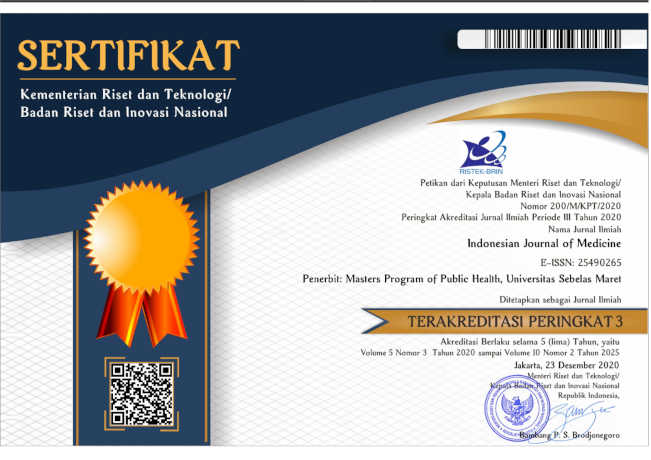Dietary Pattern As a Risk Factor of Diabetes Mellitus and Obesity: Meta-Analysis
DOI:
https://doi.org/10.26911/theijmed.2021.6.1.366Abstract
Background: Non-Communicable Disease is a disease that is considered unable to transmit or spread from one person to another but is a cause of death globally, especially diabetes mellitus and obesity. According to WHO, the number of deaths due to PTM in 2016 was 40.5 million (71%) worldwide. Diet is one of the risk factors for Diabetes Mellitus and Obesity. This study aims to analyze the effect of diet as a risk factor for diabetes mellitus and obesity.
Subjects and Method: This study was a systematic review and meta-analysis using a cross-sectional design. The articles used in this study were obtained from several databases, including PubMed, Google Scholar, Springerlink, and ScienceDirect. The articles used in this study were those published from 2011-2020. The article search was carried out by considering the eligibility criteria defined using the PICO model. P: adults, I: unhealthy eating patterns, C: healthy eating patterns, and O: Diabetes Mellitus and Obesity. The keywords to search for articles were "dietary pattern", "risk", "obesity", and "diabetes mellitus," and "adjusted odds ratio". The articles included in this study were full-text articles with cross-sectional study design. Articles were collected using PRISMA flow diagrams. Articles were analyzed using the Review Manager 5.3 application.
Results: A total of 15 articles were reviewed in this study. The meta-analysis showed that an unhealthy diet increased the risk of Diabetes (aOR= 1.65; 95% CI= 1.29 to 2.11; p <0.001). The meta-analysis of 9 articles also showed that an unhealthy diet increased the risk of obesity (aOR= 1.42; 95% CI= 1.21 to 2.66; p <0.001). This meta-analysis combines primary studies from Swaziland, China, Ethiopia, Kenya, America, Malaysia, Ghana, Romania, Nepal, Ireland, and Korea.
Conclusion: Unhealthy diet is a risk factor for diabetes mellitus and obesity.
Keywords: dietary pattern, diabetes mellitus, obesity, cross-sectional
Correspondence: Linda Wahyu Septiananwati. Masters Program in Public Health, Universitas Sebelas Maret, Jl. Ir. Sutami 36A, Surakarta 57126, Central Java. Email: lindatian81@gmail.com.
Indonesian Journal of Medicine (2021), 06(01): 82-94
https://doi.org/10.26911/theijmed.2021.06.01.09.
References
Ali R, Nuryani (2018). Sosial ekonomi konsumsi fast food dan riwayat obesitas sebagai faktor risiko obesitas. Media Gizi Indonesia. 13(2). DOI: 10.204-73/mgi.v13i2.123–132.
Azkia FI, Wahyono TY (2018). Hubungan pola konsumsi makanan berisiko dengan obesitas sentral pada wanita usia 25-65 tahun di Bogor Tahun 2011-2012. Jurnal Epidemiologi Kese-hatan Indonesia. 2(1).
Beigrezaeisara, Ghiasvand R, Awat F, Bijan I (2019). Relationship between dietary patterns and incidence of type 2 dia-betes. Int J Prev Med. 10: 122. https://dx.doi.org/10.4103%2Fijpvm.IJPVM_206_17.
Chamieh MC, Moore HJ, Summerbell C (2015). Diet, physical activity and socioeconomic disparities of obesity in Lebanese adults. BMC Public Health. 15, 279 (2015). https://doi.-org/10.1186/s12889-015-1605-9.
International Diabetes Federation (IDF) (2017). Diabetes atlas seventh edition 2017. Dunia: IDF.
Kadir A (2016). Kebiasaan makan dan gangguan pola makan serta pengaruhnya terhadap status gizi remaja. Jurnal Publikasi Pendidikan. 5(1).
Nabilah (2016). Faktor risiko perilaku penyakit tidak menular. Med J. 5(2). https://juke.kedokteran.unila.ac.id/index.php/majority/article/view/1082
Nguyen CT, Pham NM, Tran DV, Lee AH Binns CW (2016). Lifestyle and diet in relation to risk of type 2 diabetes in Vietnam. SpringerPlus. 5(1): 687. https://doi.org/10.1186/s40064-016-2313-3.
Singh M, Czernichow S, Elbaz A, Dugravot A, Sabia S, Hagger G, Kivimaki M (2012). Obesity phenotypes in midlife and cognition in early old age: The Whitehall II cohort study. J Neurol. 79(8):755-62 Doi:10.1212/wnl.0b013-e3182661f63.
Sumangkut S, Supit W, Onibala F (2013). Hubungan pola makan dengan keja-dian penyakit diabetes melitus tipe-2 di RSUP. Prof. Dr. R. D. Kandou Manado. Ejournal keperawatan (e-Kp). 1(1).
WHO (2018). Mental Health. Geneva: World Health Organization.
Zaroudi M, Jamshid Y, Sharmin M, Elham G, Jalal N, Hamid S, Bahar N, et al. (2016). Dietary patterns are associa-ted with risk of diabetes type 2. Arch Iran Med. 19 (3): 166-72. PMID: 26923887.











